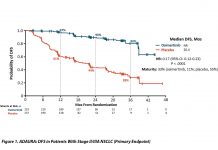Posted: April 1, 2019
The first in-human study evaluating telisotuzumab vedotin (Teliso-V)—a c-MET antibody–drug conjugate formerly known as ABBV-399— has shown encouraging activity for patients with c-MET–positive NSCLC.1 Teliso-V combines the anti–c-MET monoclonal antibody ABT-700 (telisotuzumab) with monomethyl auristatin E, a cytotoxic antimicrotubule agent.
Of the 48 patients enrolled, 35.4% had NSCLC and all were heavily pretreated, receiving at least four prior therapies. Thirty nine unselected patients were in the dose-escalation phase, and nine patients with c-Met–positive NSCLC participated in the dose-expansion phase. c-Met overexpression was defined as an immunohistochemistry membrane H score of 150 or greater. Dosages ranged from 0.15 to 3.3 mg/kg and were administered intravenously every 3 weeks.
The maximum-tolerated dose was not identified, but the dose of 2.7 mg/kg was selected as the phase II dose based on overall safety and tolerability. One patient each in the 3.0 mg/kg and 3.3 mg/ kg groups experienced dose-limiting toxicities. The most common adverse events (any grade) were fatigue (42%), nausea (27%), constipation (27%), decreased appetite (23%), vomiting (21%), dyspnea (21%), diarrhea (19%), peripheral edema (19%), and neuropathy (17%). The most common highergrade (> 3) treatment-related adverse events were fatigue, anemia, neutropenia, and hypoalbuminemia (4% each).
Partial response was seen in three of the 16 (18.8%) patients with c-Met–positive NSCLC who received 2.4 to 3.0 mg/ kg of Teliso-V (95% CI: 4.1% to 45.7%). The duration of response was 3.1, 4.8, and 11.1 months; progression-free survival was 5.7, 6.0, and 15.4 months. No other patients experienced response.
Based on these early but encouraging data, the IASLC Lung Cancer News spoke with Karen Kelly, MD, associate director for clinical research at the UC Davis Comprehensive Cancer Center and chair of the lung cancer committee in the SWOG Cancer Research Network, about c-Met immunoconjugates. Dr. Kelly, a long-time member of the IASLC, is a coauthor on the Teliso-V trial.
Q: What percentage of patients with advanced NSCLC are known to be Met positive? Are there any differences based on histology?
A: The exact percentage of patients with advanced NSCLC whose tumor express the MET receptor by IHC is unclear due to 1) methodology differences in the assays and their definition of positive expression, 2) the retrospective and single-institutional experience of most studies, and 3) the limited number of advanced disease specimens analyzed. In the randomized phase II study evaluating the Met antibody onartuzumab plus erlotinib versus erlotinib plus placebo, 128 patients had sufficient tissue for MET IHC.2 Fifty-two percent were Met positive. Only 10 patients had squamous cell histology, and the remainder had adenocarcinoma. In the subsequent phase III trial in which Met positivity was required, 1,790 patient samples were screened, but the percentage that was positive was not reported. A total of 499 (28%) patients enrolled, 58% had nonsquamous and 26% had squamous histology.3 Overall it appears that the approximately 50% of patients with nonsquamous histology have Met expression. In squamous cell histology the percentage is unknown, but in early-stage NSCLC it has been reported to be approximately 25%.4
Q: To what extent, if any, does this immunoconjugate target c-Met amplifications or exon 14 skipping mutation?
A: Met receptor protein expression is required for Teliso-V activity. MET amplification or MET exon 14 skip mutations may or may not result in a concordant increase in protein expression. Data from the phase III onartuzumab trial demonstrated MET amplification in only 33% of the samples from enrolled patients. I am not aware of data analyzing patients with exon 14 skip mutations for concordance with protein expression. Testing for MET amplification or mutations cannot substitute for protein expression testing.
Q: Could this agent be reasonably expected to have activity in patients who have EGFR mutations who develop c-Met amplification as a mechanism of TKI resistance?
A: As just discussed, MET amplification alone is not a biomarker for Teliso-V. However, if this subgroup of patients had a corresponding increase in Met protein expression, Teliso-V should be active. I would encourage a trial to evaluate Teliso-V in this population.
Q: Are there any major toxicity concerns?
A: No, I do not have any major concerns about toxicity. Teliso-V is a well-tolerated chemotherapeutic agent as we would expect from its direct delivery to the Metpositive tumor cells. Its mild side effect profile is an attractive feature.
In closing, I know we are all excited about immunotherapy and oncogenicdriven inhibitors, but there remains a large unmet need for the majority of patients for whom these agents fail or who are not eligible to receive them. I am very excited to see this new class of agents being evaluated in lung cancer. ✦
References:
1. Strickler JH, Weekes CD, Nemunaitis J, et al. First-in-Human Phase I , Dose-Escalation and -Expansion Study of Telisotuzumab Vedotin, An Antibody–Drug Conjugate Targeting c-Met, in Patients With Advanced Solid Tumors. J Clin Oncol. 2018;36(33):3298-3306.
2. Spigel DR, Ervin TJ, Ramlau RA, et al. Randomized phase II trial of Onartuzumab in combination with erlotinib in patients with advanced non-small-cell lung cancer. J Clin Oncol. 2013; 31(32):4105-14.
3. Spigel DR, Edelman MJ, O’Byrne K, et al. Results From the Phase III Randomized Trial of Onartuzumab Plus Erlotinib Versus Erlotinib in Previously Treated Stage IIIB or IV Non-Small- Cell Lung Cancer; METLung. J Clin Oncol. 2017; 35(4):412-420.
4. Hellmann MD, Anderson TA, Eng J, et al. Clinicopathologic characteristics and prognostic impact of MET receptor overexpression in patients with stage I-IIIA squamous cell lung carcinomas (SQCLCs). J Clin Oncol. 2014;32(5 suppl): Abstr 7570.











